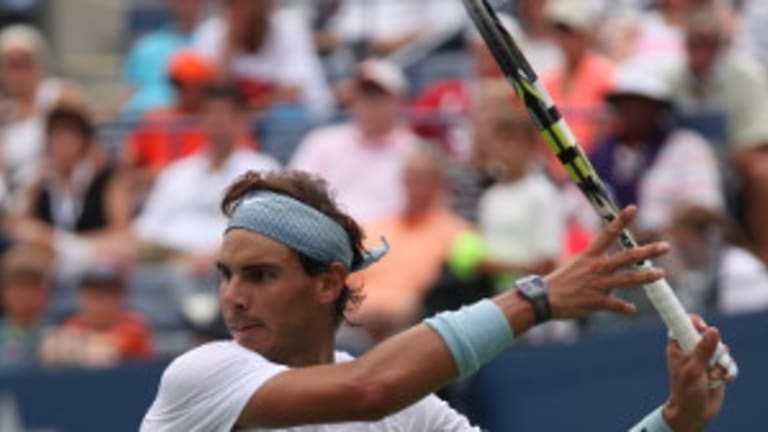Nadal’s opponents have always commented on the heaviness and deceptive trickiness of his shots. The ball kicks two ways: Topspin brings it toward an opposing player and up above his shoulder, while sidespin sends it away from that player's (usually weaker) backhand. The effect is easier to appreciate from up close. Inside Ashe Stadium today, you could see that every forehand from Nadal left Harrison with two choices, neither of which could be called attractive. He could try to step forward and get over the ball on the rise, or he could back up and hit it when it came down. The latter choice was the safer one, obviously, but it also left Harrison exactly where he didn’t want to be: 10 feet behind the baseline. This is the Nadal game: Even without hitting outright winners, he can dictate with the weight and spin of his forehand alone.
“He won pretty comfortably,” Harrison admitted afterward. This was the second time he had been outclassed by a top player early in a Grand Slam this year. The other defeat came at the hands of Novak Djokovic in the second round of the Australian Open. If there’s any consolation for Harrison, this match was more competitive.
“The way I played after getting broken in the first game,” Harrison said of his first-set performance, “was kind of the way I had envisioned it, controlling things on my service game, hitting some big serves, hitting some big forehands.”
You might say that this is wishful thinking from the American. In the final two sets, Nadal opened up the court and moved forward on him at will. Harrison, despite his strong serve and forehand, was left spinning his wheels at the back of the court. Harrison once made winning Grand Slams his goal, but if we’ve learned anything about him in the past year or so, it’s that he's miles from the top of the game. While Harrison’s ranking has improved from a low of No. 132 a month ago, it’s still well off his career-high No. 43 last summer.
Yet if early losses at Grand Slams have become a tradition with Harrison, so has his ability to sound like a motivational speaker in the interview room afterward. Even after this sound beating, he was his usual inspirational self.
“Anyone that's ever gone through a rough patch in a career they’re passionate about, if they didn’t learn from it, they’re not really trying very hard," Harrison said in his slight Southern drawl. "Whether it’s tennis or whatever it is, you look back and reflect on unsuccessful moments. You reflect on failed opportunities and trials and things that you’re trying in your game. You learn from it. You ultimately come out a better player from not having the success you want.”
After hearing him say these words, I wondered briefly if I was trying hard enough in my own career. We don't know where Ryan Harrison will end up as a player, but he already sounds ready to become a coach. Harrison, naturally, has decided to look at his fall in the rankings as an opportunity, as something that will keep him from “coasting,” as he said today. He also said that he has tried to shorten his backhand swing, so that "less can go wrong with it."
So which is the Ryan Harrison that matters? The one we see struggling on court, the one who has lost 20 straight matches to players in the Top 10, who plays too far back, misfires on too many forehands, leaves too many backhands in the middle of the court, and loses his temper too often? Or should we focus on the well-spoken and analytical Harrison that we see in the interview room, the one who seems hell-bent on making the most of what he has?
Nadal, as he often does, had the answer for us.
Rafa was asked in his own presser, “What does [Ryan] have to do to get into the upper class?”
“Improve,” he said flatly. When that produced a few laughs, he shrugged.
“Is always the same for everybody....If he’s able to keep improving, and to be more stable, play with less unforced errors, he’ll have his chance.”
Improving, being more aggressive, becoming more stable, adding a volley, shortening his backhand swing: It may never be enough to get Ryan Harrison where he wants to go, but it's the only path forward.
As Harrison said today, when he was asked if he had lost any faith in himself, “I’m 21 years old. If I lost faith in my career at this point, that would be pretty embarrassing.” Sometimes the faithful can't be choosers.
